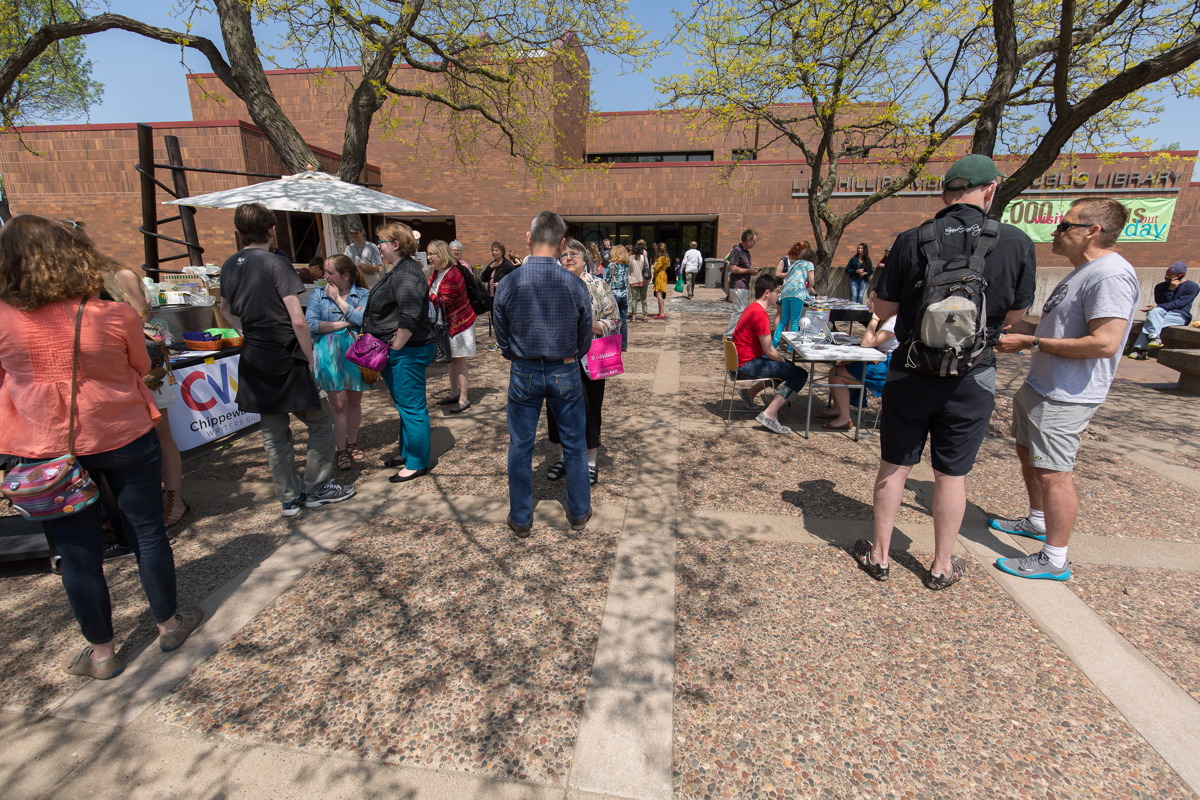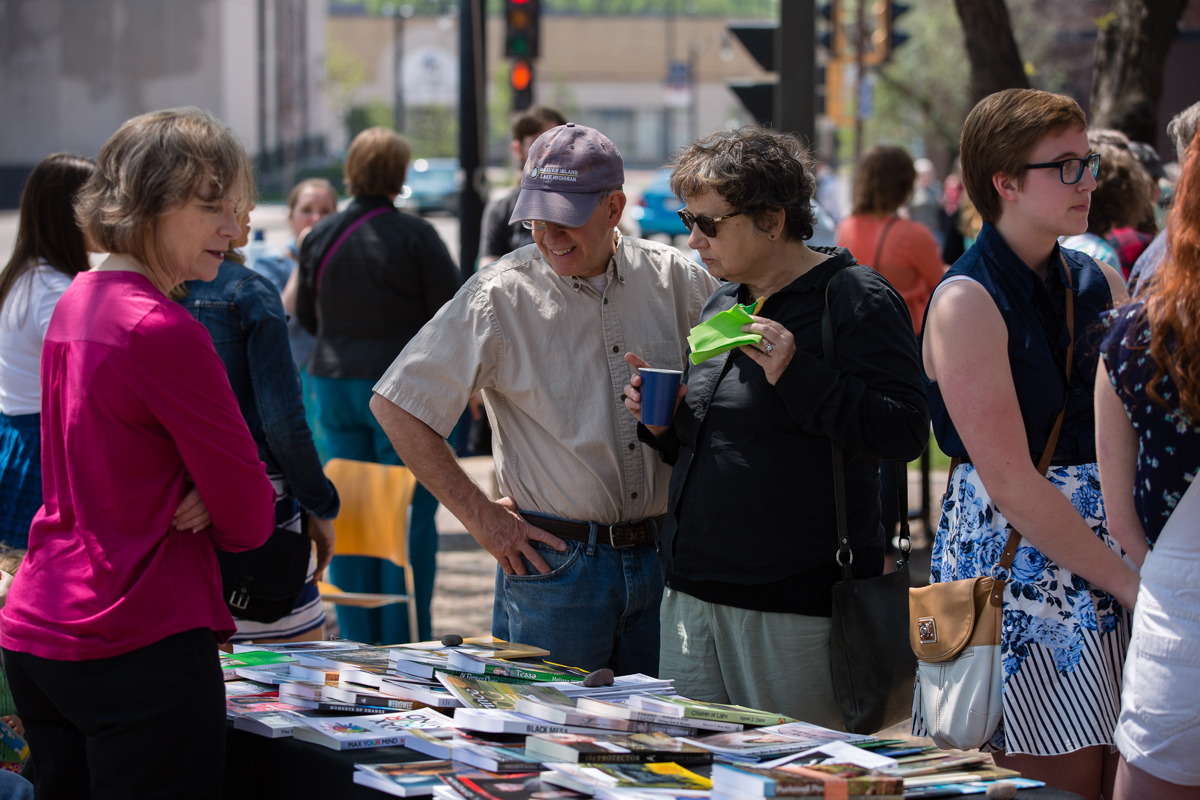By B.J. Hollars
No entry-level creative writing classroom is complete without a reading of Billy Collins’ “Introduction to Poetry”, a poem that pleads with students to simply let poems be.
Admittedly, it’s a task easier said than done, especially when so much of students’ educational lives now involves synthesis, analysis and deconstructing a thing into its simplest parts. By poem’s end, the resigned narrator laments that despite his pleas, readers will likely still tend to beat poems “with a hose / to find out what it really means.”
Yet what happens when we allow meaning to take a back seat to musicality?
For a decade now, Drs. Audrey Fessler and Jeff Vahlbusch have been doing just that, organizing the International Poetry Reading—a one evening event each spring dedicated to encouraging community members to recite poems in languages from across the world. And that’s the beauty of the event: a chance to appreciate the sound of diverse languages, as well as to honor the cultures of the people who speak them.
The impetus for the International Poetry Reading began long ago, during Jeff and Audrey’s time as junior faculty members at Washington College in Chestertown, Maryland.
“It was a small college, it was a small event, and it lasted for an hour, maybe an hour and a half, “Jeff remembers. “Perhaps 20 people read in five or six or seven languages. We loved it, we thought it was magical.”
“And then we arrived here at UW-Eau Claire,” Audrey continues, “and thought, ‘This would be a wonderful kind of gift and tradition perhaps we could institute here.”
In 2006, Jeff and Audrey organized the very first International Poetry Reading here in Eau Claire. They kept expectations low, hoping for five or six languages to be represented. They were shocked to find the reality far exceeded their expectation: no fewer than 30 languages were represented.
“We were blown away,” Audrey says. “We just barely made it into our little two hour allocation of time."
They not only exceeded their expectation in terms of participants, but in terms of audience members as well, so much so that folding doors were soon spread wide to make room for overflow rooms.
“Our startlement and joy at the initial community response has kept us motivated for a long time to continue,” Audrey notes.
“Have there been any moments that really stand out in your mind?” I ask. “After all the poems you’ve heard and all the languages, what really resonates with you two?”
“The ones that have hit home for me, often, are when you expect someone to read and they sing,” Jeff says. “Where you expect someone to read and they chant.”
He goes on to describe an instance in which a woman from Cambodia leaned into the microphone, informing the audience that in her country they don’t read poems, they sing them.
“And she stepped back from the microphone and in a crystal clear, little but incredibly impressive voice she sang for four minutes,” Jeff says, his eyes glossing over in memory, “and it was evocative, amazing, and wonderful. And it brought down the house.”
Audrey adds that for her, the most memorable moment involved being “plunged into silence.”
“At this event people listen with all their might because they’re hearing languages they’ve never had the opportunity to hear before,” she explains. “They’re hearing sounds that they might not have known the human voice was capable of making.”
After 45 minutes or so of intense listening, all sounds were momentarily silenced as a reader shared a poem in American Sign Language.
“Suddenly there was nothing there for most audience members’ ears,” Audrey explains, “but there was this beautiful body in motion of poetry that had so much eloquence and grace and perfect intelligibility to audience members…”
Of course, moments such as these don’t just happen; they require lots of work. And for the past decade, Jeff and Audrey have dedicated hundreds of hours each year to their effort. There are a range of duties to be fulfilled, though perhaps most complicated of all is creating a booklet which allows audience members to read each poem both in its original language as well as translated into English.
“There’s an awful lot of work to do in just putting together the book,” Vahlbusch says, “…formatting all of these different scripts and languages—some of which our computers can’t handle—is a very, very exciting kind of work.”
“So how has the International Poetry Reading contributed to the Chippewa Valley?” I ask.
“One thing we have thought for years,” Jeff explains, “is that this is an event in which we in the Chippewa Valley get to see what an amazingly diverse place we actually are, and how many different people’s languages and traditions, ethnicities and races, come together in this small spot in Wisconsin to live together.”
He’s right, and were it not for events such as this, perhaps we’d never stop to notice the depth and range of our community.
Art often finds a way to bring people together, I think, and in this instance, the collision of poetry and culture seems to do just that, as well as instilling a deeper affection and appreciation for the place that we call home.
I’d hate to lose such an event, and when I ask Audrey and Jeff if it’s really over, Audrey says, “We would like it not to be the end. It has certainly been a great labor of love for us both.”
She goes on to say she’s hopeful that someone else might be willing to carry it on for a while.
“Free training,” Jeff says with a smile.
“And a ton of gratitude,” Audrey adds.
This year, the tenth International Poetry Festival will be from 7:00-9:00p.m. on Wednesday, May 4 in the Ojibwe Grand Ballroom in the Davies Center on the UW-Eau Claire campus.
If it is, indeed, the last chance we have to come together in this way, be sure to clean out your ears, listen carefully, and savor as much as you can.
***
Music courtesy of Lulzacruza


































